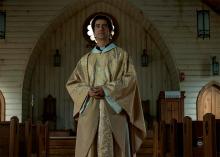At times, it’s shocking, violent and gory. It’s also one of the most compelling pop culture depictions of Christian faith and religion in recent memory.
Midnight Mass, a limited series released on Netflix in 2021, follows Riley Flynn, a former venture capitalist, who has returned to his isolated, dwindling hometown on Crockett Island. He’s just served four years in prison for killing someone in a drunk-driving incident. Coinciding with Riley’s return, a mysterious new priest, Father Paul Hill, arrives on the island to provide leadership at the community’s only church.
In the weeks that follow, the people on Crockett Island experience strange miracles and a Christian revival that ultimately threatens to divide the community between those who feel safe in the church and those who do not.
Over the course of the horror series’ seven episodes, viewers encounter characters that might seem familiar to people who have spent time in religious communities in North America.
We meet Ed Flynn, Riley’s father, a fisherman who is embarrassed by his son’s actions and reluctant to welcome him home from prison; and Annie, Riley’s devout, forgiving mother who tries to keep the peace.
We also get to know Erin Greene, a schoolteacher dealing with the trauma of an abusive upbringing; Joe Collie, a man who is ostracized from the community for his drunkenness and past mistakes; Bev Keane, a zealous, judgmental and influential member of the church; and Sheriff Hassan, a Muslim lawman who has trouble fitting in with the town’s predominantly Catholic population.
While trying to understand the fantastic things happening around them, the residents of Crockett Island deal with questions of faith, doubt, forgiveness, the afterlife and reconciliation.
I recently watched Midnight Mass for the second time and was struck by something Father Paul says in the final episode. Fleeing a looming threat, the people of Crockett Island seek shelter at a recreation centre that was built using church funds.
Bev believes the space isn’t big enough to hold everyone and appoints herself the judge of who can enter the rec centre and who must stay outside to face certain death. She starts by turning away a man because he stopped attending the church long ago.
Distressed by Bev’s actions, Father Paul invites the man, and everyone else, into the church.
“All are welcome!” he shouts. “All have to be welcome or this isn’t really God’s house!”
I don’t recall giving that line a second thought the first time I watched Midnight Mass two years ago, but when I heard it the other night, it cut me to the core.
In the days since, as I’ve thought about a church conflict that is weighing on my mind, I’ve cast myself as Father Paul—opening the doors of the church and insisting everyone has a place inside.
If I’m honest with myself, though, from time to time I also have Bev Keane-like tendencies toward passive aggression, judgment and urges to demarcate who belongs and who doesn’t.
This issue of Canadian Mennonite contains several articles about things people are doing to come together despite their disagreements. By doing so, I believe they are working toward a church where all are welcome.
In the feature, Will Braun uses the Beatitudes as a starting point to imagine ways people with opposing political views might work together. Amy Rinner Waddell reports on a recent Mennonite Church B.C. forum where participants explored healthy disagreement, and Arli Klassen’s latest column challenges us to live out a hope and faith that God’s gift of unity amidst diversity is possible in our congregations.
Elsewhere in this issue, in the first article in a six-part series, Kara Carter tells the story of how members of one Mennonite Church Eastern Canada congregation are reaching out to their community.
As always, my hope is that these articles inform and inspire you as you live out your faith and love your neighbours.
All have to be welcome or it isn’t really God’s house.
Read more editorials:
The institution of messiness
Tell us what you think
Birding with Alvin
Of beets and chainsaws
Uncommon global access




Add new comment
Canadian Mennonite invites comments and encourages constructive discussion about our content. Actual full names (first and last) are required. Comments are moderated and may be edited. They will not appear online until approved and will be posted during business hours. Some comments may be reproduced in print.